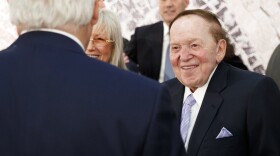DAVID GREENE, HOST:
So if you happened to stop by the Trump International Hotel in Washington, D.C., this summer, you would have run into plenty of tourists, lobbyists, Cabinet members and also foreign visitors. And that last category of guests has renewed questions about whether Trump may be violating the Constitution's ban on accepting foreign emoluments. And now an ethics group and the Justice Department are preparing their courtroom arguments for the first lawsuit over emoluments. Let's get some help from NPR's Peter Overby answering a basic question. What is an emolument?
PETER OVERBY, BYLINE: In the roughest shorthand, the Constitution's foreign emoluments clause says federal officials can't take goodies from the governments of other countries. Citizens for Responsibility and Ethics in Washington, or CREW, sued President Trump three days after he took office. It said Trump is, quote, "submerged in conflicts of interest due to foreign government spending at the D.C. hotel." The Constitution says Trump could ask Congress to let him except emoluments. But back in January, his lawyer, Sheri Dillon, said he doesn't have to.
(SOUNDBITE OF ARCHIVED RECORDING)
SHERI DILLON: No one would have thought when the Constitution was written that paying your hotel bill was an emolument. Instead, it would have been thought of as a value-for-value exchange - not a gift, not a title and not an emolument.
OVERBY: The Justice Department agrees. It says in the CREW case, Trump's hotel business has nothing to do with being president, so there are no emoluments. But the meaning of the word has evolved since the Constitution was written in 1787. Most dictionaries from that era are more sympathetic to CREW.
JOHN MIKHAIL: So prior to maybe December of 2016, I had not given much thought to the word emolument.
OVERBY: John Mikhail is a professor at Georgetown Law school. Starting last winter, he and his researchers looked at all the known dictionaries between 1604 and 1806 that define emolument. That's 40 dictionaries. Mikhail said only three define the word in ways favorable to Trump.
MIKHAIL: Kind of a narrow, even technical meaning tied to the salary or official duties of an office.
OVERBY: Here's how the other 37 dictionaries define it.
MIKHAIL: A broader meaning that would encompass the sort of profits of ordinary market transactions.
OVERBY: The three words most often used to define emolument were profit, advantage and gain. As for the Justice Department's narrow definition...
MIKHAIL: They had selected, maybe cherry-picked even, a couple of dictionary definitions.
OVERBY: Mikhail said he looked but couldn't find any evidence that the Constitution's framers ever referred to those two dictionaries. A Justice Department spokeswoman declined to comment on the lawsuit. CREW is seeking a broad definition of emolument and an order to stop Trump from violating it. But back to that word, emolument.
PETER SOKOLOWSKI: It's clear in the 1780s, this was a very broad term understood by most people.
OVERBY: Peter Sokolowski is a lexicographer at the dictionary publisher Merriam-Webster.
SOKOLOWSKI: The definition that is the broader one, which happens to be the one that was in most common use in the 18th century, is the one that has sort of fallen away.
OVERBY: At the Cato Institute, senior fellow Walter Olson said this lawsuit only starts the battle to define emolument.
WALTER OLSON: Part of the question is who gets to decide what it means. And the courts will have a say. But Congress, in the end, probably has more of a say.
OVERBY: Congress has been approving or rejecting emoluments for lesser officials for more than 200 years. Another way the issue could come up, if members of Congress move toward impeachment. Peter Overby, NPR News, Washington.
(SOUNDBITE OF MNDSGN'S "HOMEWARDS") Transcript provided by NPR, Copyright NPR.
NPR transcripts are created on a rush deadline by an NPR contractor. This text may not be in its final form and may be updated or revised in the future. Accuracy and availability may vary. The authoritative record of NPR’s programming is the audio record.






